- Home
- G. Wells Taylor
The Urn Page 4
The Urn Read online
Page 4
And, Baba was a sure-footed little horse. She carried me with only one complaint: she was made uneasy by our honor guard of wolves. These black beasts ran to either side, never near enough to be more than glimpsed, but we heard them scrabbling and breaking their way through the thick forest around the path. There was no doubt they were watching, and warding our precious cargo.
Baba did not like the wolves, but as all loyal animals she soon tuned her spirit to her rider’s pitch. True, I was perplexed and worried about the journey, but did not fear the wolves. I had seen them in communion with the master too many times to ever think they’d bring him harm—so I doubted they would harm his servant.
When I caught their eyes flashing in the shadows now and then to either side, I knew the look to be a soulful one of homage paid to that which I held before me.
There were moments when my vision was blurred by the steam from my breath, as my fingers grew numb and cold, that I realized the full measure of my mission, and my heart stuttered at the prospect. But what choice had I? The peasantry would come for spoils once word had passed between them that the castle was undefended. Had they known the master was vulnerable, they would speed there for retribution and blood.
And, I was reminded of why they were bitter toward their lord in the form of the frozen bones that littered our path in places. Most splintered and fragmented as though they’d fallen from a great height, they lay about the forest floor, and protruded in pieces from the snow-swept landscape. Of varied ages, the bones had been shattered on impact, gnawed upon by vermin or cracked and the marrow sucked out.
From time to time I was startled to see an entire skeleton draped in the branches above me, or a moldering corpse slumped against the stones beside the way, rotted clothing still clinging in places.
The land around the castle bore witness to the master’s harsh rule; his centuries of command had covered the mountainside with bony sediment. But it was his mountain; he was their master—my master.
Oh Master!
So, I wondered again about the Englishman who was the last of the master’s invited guests, and I rued the day he’d been left alive as a plaything of the brides.
No one living could sympathize with a man in that predicament, since if it were not his neck on their platter it might have been one’s own, but I had always questioned the cat-like nature of the witches when they had their prey close at hand. I did not care about their playful cruelty so much, but delaying the blow that would kill him had opened the door to the Englishman’s escape.
I squeezed the urn closer to my chest and groaned. The same Englishman had been with the others in the bloody battle before the gates. It was he who had cut the master’s throat.
I knew him by sight because he’d tried to bribe me with a gold piece, begging me to post letters that were no doubt intended to summon aid. The fool! As though any amount of money would be worth a Gypsy’s honor—a simple honor sworn to so great a lord.
But I remembered hearing of his escape, and searching for him with my brothers. I had hoped the wolves had taken the man, as they took any fool who wandered near the castle, or that the river had swallowed him up—or that his bones would have lain somewhere ahead.
Alas, that was not the case, and as a result the master...
Baba whinnied then, a short and wheezy snort, and I peered into the looming gray tree branches that reached in toward the path from the pitch black beyond.
I wondered who else had survived a stay in the castle, for I knew that down all the centuries, the Englishman could not have been the only one to escape.
Baba’s gentle pace and rocking motion had me nodding near sleep, so before I could take action and set up a camp for the remainder of the night, I drifted into a hazy place where memories felt like reality and reality like dreams.
The warm scent of plums rose from the slivovitz I’d spilled in my beard. I had sipped it to ward off the chill...
“It will not be death like your death, Horvat. I do not live as you do, so what would be an end to you could be considered—ah, there are no words. This is something that should not be judged by your mortal senses. I am beyond your powers of comprehension,” my master had told me, late one night as he repeated his instruction should the worst ever happen. “Learn the contents of the book and follow the directions within. There will be hope for me when there would be none for one like you.”
He spoke to me thus, from time to time, though he rarely spoke about things that were not of great import. And my name, yes, he did use it at such times I believe, to underline the significance of the lesson he was giving, and to pound home the punishment that would await if I were to ever fail him.
Of course my master, being a survivor as he is, would not have left certain things to chance. Someone that old well understood the risks of going about the world, and would have in place the safeguards necessary to shift the odds in the favor of survival.
Being a creature well-acquainted with death, and having experienced many brushes with it, there was little doubt that he would lay out plans for his survival: methods, money would be cached and allies would be in place that would come into play, to act in his stead if he were beyond the ability to act for himself.
And so, his employment of my brother Gypsies to safeguard his castle, and the many familiars over the ages, custodians or guardians like myself, and their education in the arts of his survival, and in the worst case, of his resurrection.
“Read the book,” he had said, hypnotic eyes flaring crimson. “And follow it to the letter.”
Baba snorted and her shivering flanks brought me around. My eyes snapped open, but I had to raise my mittens and rub the fur against my frozen cheeks to be sure I was alive, for there was a light in the trail before us. Of blue flame it was, like the witch fire from the peasants’ tales, and I remembered Szgany talk of the fiery faerie rings that guarded lost treasure.
Then I trembled remembering the pale light I’d seen in the castle and graveyard. Similar this was, and while it looked more like fire there was no warmth.
These flames before me glimmered low to the ground and ringed round the ancient trunk of an oak tree that had only a few malformed and splintered stumps in place of branches.
Baba let out a frightened whinny when I tried to nudge her past the strange flames, and I kicked her flanks when she continued to balk. I had no interest in dismounting and leading her anywhere near the strange blue light playing about the tree.
She only snapped her head to and fro, but would not budge.
“Now, Baba, forward!” I growled, jerking the reins, but that only got her to rear slightly, and stamp excitedly in place.
I grumbled under my breath and gripped the urn tightly to dismount, but I froze.
A sound had come from behind. It was like a hoarse shout or moan, a despairing noise that a man would make only in the depths of some dire distress or in the presence of his doom.
I listened, and somewhat distantly could make out the snapping of branches, even the thump of someone moving over the ground with a heavy tread.
We were being followed.
Glancing to either side, I saw that our escort of wolves was gone, and again the aching groan came from the rear.
Baba heard it also for she suddenly bolted forward over the stones, veering crazily around the faerie fire and past the stooped old oak. Her charge forced me forward to grip the horse with my knees, holding the urn beneath me and parallel to her broad back—its precious contents protected by our flesh.
More than a half-mile on, Baba slowed either from fatigue or because her fears had calmed. She took up her gentle pace again and we continued moving along the dark way. There were no more sounds from behind, but I had stopped looking for a place to camp that night.
CHAPTER 4
FROM THE GYPSY HORVAT’S JOURNAL
7th November, 1893. Race to Varna
I awoke near noon the next day having traveled until sunrise. The overcast sky and thick trees a
round my camp had kept the growing light from disrupting my sleep, so I felt somewhat rested despite the welts on back and buttocks from lying on roots hidden beneath my blankets.
I rubbed at my frozen cheeks and the frosted whiskers crackled, so I levered myself into a sitting position and set about rekindling my small fire.
As I worked, I glanced over and was greeted with a snort from Baba as she nibbled dry brown shoots and sent steamy puffs of chill air about her leather hobbles.
I turned to the master’s urn. It stood by my bedding and was wrapped in horse blankets, and had been dusted by drifting snow. But that one glance brought rushing back the urgency of my journey, and my terror of the night before—mysterious sounds and what had seemed to be pursuit. The memory galvanized my sluggish limbs, and I surged from the blankets to prepare for travel.
I glanced worriedly at the dense forest that pressed in on the small clearing I’d chosen for camp, pondering the noises I had heard in the night. Surely, this had been imagination—nothing more—I decided, as I set water to boil and began feeding Baba sparingly from the sack of oats I had brought along.
I knew that she would be able to eat scrub grasses and forage for what she could find when the trail led us to the open spaces in the valleys between the mountains. I had been feeding her in preparation for the winter and so she had already developed a thick layer of fat that she could draw upon in these first days of flight.
She snorted, and her withers quivered beneath my hand—the tremor like a memory of our night travel, and I realized that she would have had to imagine the sounds, too. So my last attempt at illusion was dispelled. The sounds had not been the fancy of an anxious mind; they’d been real.
I mixed hot water in a cup with a good three ounces of slivovitz. This answered the chill, and lubricated my own meager breakfast as I ate a quick meal of cheese, bread and dried apple before loading my gear upon Baba and setting out on the trail again.
A quick check of the urn before mounting showed little through the metal vent, though warm, moist air still issued from it. There was a coppery smell, and a hint of decay, but nothing more. I dared not open the urn for a better look, so I wrapped it in horse blankets once again.
I rode for most of the day, making good time following the master’s map that took us down from the high mountains through narrow passes and finally brought us to broad wooded valleys where the snow collected in patches, and the hardy grasses and dense undergrowth still grew in broad, dark swaths about the tree trunks.
I had seen no other travelers or sign so far, though faded tracks in the snow and dirt had marked the passage of foraging animals.
I had decided against doing any hunting for the first couple days, as the musket’s report would echo many miles in the mountains, and draw attention if anyone was in earshot. Now that the first night of travel had been haunted, I was even more reluctant to try the weapon so fresh game would not be added to my simple fare.
Late in the day I dismounted to give poor Baba a rest, and we stopped where a forest of young oaks opened up overhead. There I unwrapped the urn again, and peered in.
Enough gray light filtered through the vent to give me a glimpse of the bottom where a glistening ruddy lump lay in a dark and stringy mire of scarlet. The human and pig’s blood seemed to have coagulated, but what I saw looked “wet” enough to decrease the urgency of hunting for a new source of the precious fluid.
The second night, I made camp on a rocky shelf that overlooked a small defile where a narrow stream splashed through a jumbled landscape flecked with snow and ice. The space on which we rested was large enough for me and Baba, and was accessed by a tangled path just wide enough to admit the horse.
The exertions of travel were weighing on me, so after a quick meal I fell asleep...
...only to awaken later with my heart racing, and my eyes searching the darkness. For some seconds I lay there in my blankets by the dead coals of the fire.
Baba stood nearby, a moving shadow in the darkness. She ground her teeth and stamped, sensing that I was awake.
She had heard something too. I was just about to speak and calm her when a familiar groaning sound echoed across the silent forest.
It came the same as the night before, a man-like call at a distance, though there seemed to be little menace now. Instead, it sounded forlorn. Lost. Despairing.
I whispered something to Baba and hugged my unsheathed sword to my chest before rolling on my side and peering down from the shelf to where the black water ran against its frosted banks.
A sudden movement against the snow showed silhouettes of wolves moving to the north. With that sight came some comfort, and I was able to sleep again knowing they were on guard.
The third night I found a sloping crevice in the forest floor where we could stop. It was sheltered along its length by high rock walls and a stony overhang fringed with trees. The closed end rose to where thick young firs sprouted that would help hide the camp and make it defensible.
Baba had made a noisy meal of the feed I’d brought her, and the dried apples I carried as treats for us both. She also cropped at brown grasses and brittle plants that still clung to life amidst the mosses in the sheltered place.
I sat wrapped in blankets with the master’s urn by my side and my thoughts drifted awhile as I watched our small fire burn down to embers.
The journey had been difficult that day. The master’s map took us through twisted paths strung with prickled brambles. The hooks from those clinging vines had caught at my clothing and Baba’s shaggy hide, and I was forced to stop and cut us loose every 50 feet.
Clouds had covered the sky from dawn to dusk, and were unmoved by the bitter wind that caused the cold to press us sorely.
The master’s trail must have become overgrown since the map’s making, and I hoped there were no other unknown obstacles ahead to spite us, or wear us down.
The cold had eaten too deeply into my bones for the dying fire to warm them, and so I retreated to my bedding. At least our camp was sheltered. Directly overhead the clouds still held, but glowed brightly over a waxing moon. The overcast nights had hidden its progress, and I had not thought to consider its phase before setting out.
I laughed at the absurdity of the notion. Who cared if the moon’s light revealed our camp? It was the cold that would kill us.
I was certain, now, that the Gypsy Horvat was too old to fulfill his pledge.
My eyes closed...
Then I sprang upright at a sound.
It was demonic; a garbled, yelping scream that echoed through the frigid forest and it took me some confused moments to recognize it as coming from the wolves. But they were not howling—there was no eerie power to their call—none of the master’s music. No, they were crying for aid; they were fighting for their lives!
Then I heard the powerful and resounding howl of a single wolf—the pack leader. I remembered the great black male stood as tall as my shoulder, and nowhere in his golden eyes was there anything but strength. His voice was fierce, a battle cry he loosed upon the night, but fear was trembling at its core, and the shrieks that came in answer were shrill and could not rally—unbelievably, they crossed the freezing miles as a whimper.
No! The master’s wolves were indomitable.
My skin turned to gooseflesh as I listened, for I knew that the regions we were passing should hold no danger for the pack. There was not a beast in the land that could wring such fear from them. The wolves had followed us near populated places, but never did we go close enough to people that could endanger the beasts after dark—and no farmer, huntsman or man-at-arms would draw such terror from that pack.
The master’s wolves had never shown a sign of fear or weakness, so I trembled at the thought of what had confronted them—and caused a rout. Nothing on God’s green earth would have dared those animals, and that notion made me reach for the unsheathed sword upon my blanket.
For there were other things in the mountains that I had only heard about in
tales and legend: the old fortune tellers at the Szgany camps did more than speak of the future. At times their stories whispered of the superstitious night, where blue fire and faerie rings flickered—when the hills became home to goblins, giants and trolls, where witches knew no restraint.
And where once my dead master and his kind had prowled...
My fingers tightened on the hilt of my sword, and I flexed my arm until the keen metal glimmered in the pale light from the overcast, assuring me the blade was free of its scabbard and ready to kill.
I stared into the darkness that enveloped the open end of the sheltering crevice as the distant battle raged. The wolves’ voices grew more terrified, rising slowly at first before rushing painfully upward as strident screams were forced out. Shrieks of pain cut the shadows—the doom-soaked notes of a bloodbath filled my soul!
And then there was nothing. The forest was silent. I looked to Baba who had stood unmoving, the poor beast paralyzed with fear, before I turned back to where our rocky camp opened on the night—on the secret aftermath.
There were no more sounds of battle, or suffering or death, but still my sleep was fitful and shallow and short.
9th November. By her lethargic actions, I could tell that Baba had slept little also, but I feared any delay to rest would cause us greater trouble. The sounds from the night before still echoed in my head as I hurried about a quick breakfast.
I could not repress a grin as poor Baba watched me gulp from the flask of slivovitz and I consoled her with a hearty pat on the head, neck and shoulders. The rough love did nothing to diminish the sense of longing in her big brown eyes as I slid the flask away into my coat. She even seemed to be snuffling at the wind, hoping to catch the strong liquor’s heady scent.
The fourth day took us to the western edge of a steep valley just after noon. The sky overhead continued as a dark gray veil throughout our travel. From our elevated position, I could see through the trees that once we’d traversed the downward slope we’d cross lowland that might trouble us by way of swamp or mire buried where snow had collected in a vast white crescent. Just past that the opposite slope rose beneath a tall forest of old beech trees with few lower limbs that promised easier travel ahead.

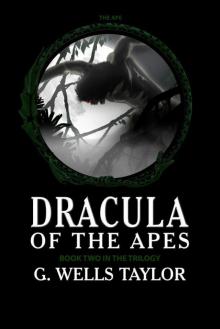 Dracula of the Apes 2
Dracula of the Apes 2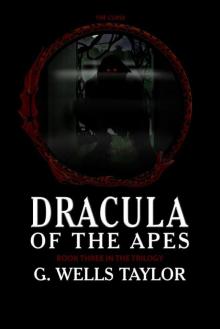 Dracula of the Apes 3
Dracula of the Apes 3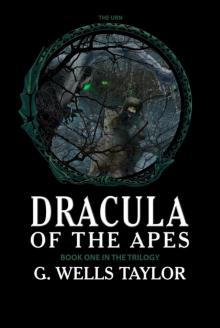 The Urn
The Urn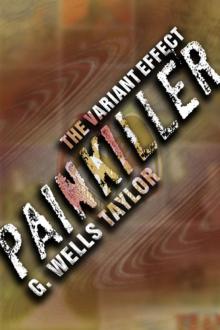 Painkiller
Painkiller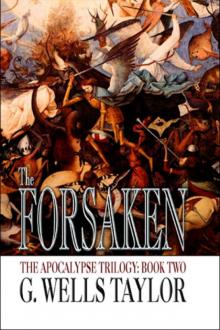 The Forsaken - The Apocalypse Trilogy: Book Two
The Forsaken - The Apocalypse Trilogy: Book Two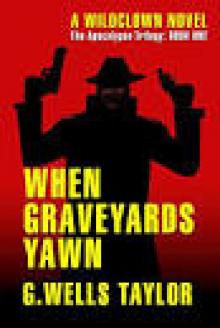 When Graveyards Yawn
When Graveyards Yawn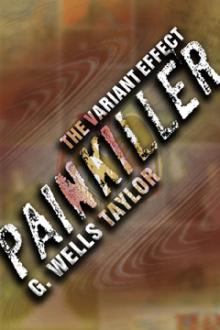 The Variant Effect: PAINKILLER
The Variant Effect: PAINKILLER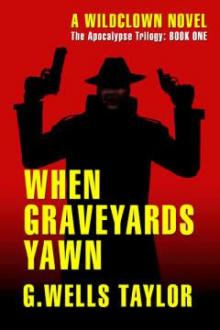 When Graveyards Yawn ta-1
When Graveyards Yawn ta-1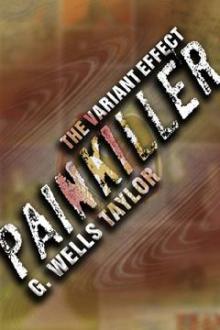 Painkiller tve-2
Painkiller tve-2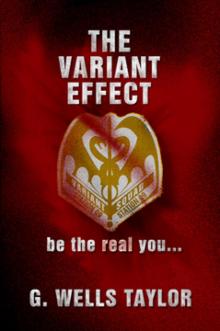 The Variant Effect
The Variant Effect